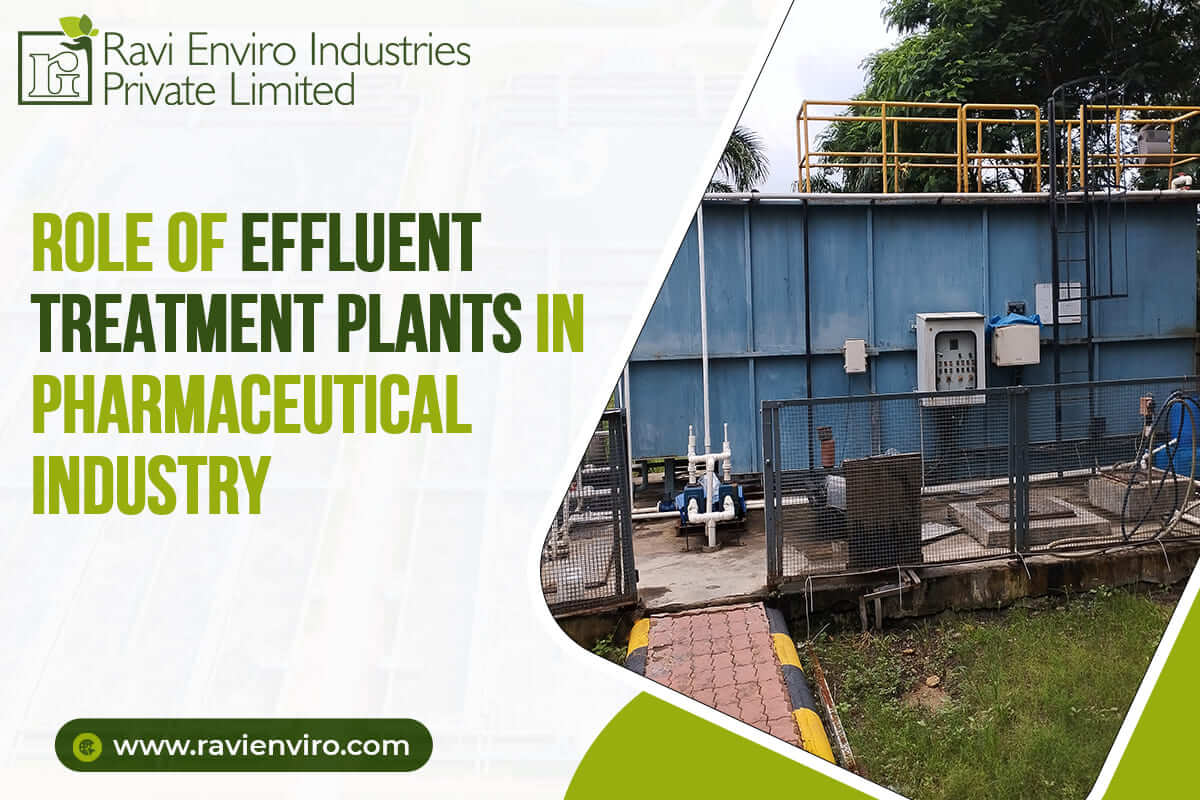
- Dec 27, 2024
- Ravi Enviro
- Effluent Treatment, ETP Plant
- 0 Comments
The pharmaceutical industry is a major player in the global economy, formulating and producing life-saving drugs and medications. However, pharmaceutical manufacturing companies also generate a high amount of wastewater, which contains hazards and toxins that can adversely impact the environment if released untreated. In this, the effluent treatment plants (ETP) play a significant role in treating wastewater from pharmaceutical processes. In this blog, we explore the role of effluent treatment plants in the pharmaceutical industry, shedding light on safeguarding public health and the environment and ensuring compliance with environmental regulations.
Understanding Effluents From Pharmaceutical Industry
The wastewater generated by the pharmaceutical industry is a mixture of different materials, such as Active Pharmaceutical Ingredients (API), heavy metals, solvents, and organic compounds. At Ravi Enviro Industries Private Limited, we bring our extensive experience of the diverse needs of pharmaceutical clients. As one of the most trusted effluent treatment plant suppliers in India, we offer customizable and scalable ETP solutions that cater to different effluent compositions. The following are the effluent traits in pharmaceutical industries:
- Organic Compounds: Solvents, bases, and chemical compounds used in production are the most common pharmaceutical effluents that could negatively impact human health and the environment.
- Heavy Metal: The pharmaceutical wastewater consists of heavy metals such as cadmium, mercury, and lead.
- Suspended Solids: Organic and inorganic particles are present in pharmaceutical wastewater in high concentrations.
- High Chemical Oxygen Demand (COD): COD measures the oxygen necessary to oxidize organic compounds found in wastewater. Pharmaceutical effluent exhibits high COD, implying high levels of organic contaminants.
- High Biological Oxygen Demand (BOD): BOD measures the oxygen microorganisms necessary to break down organic substances in wastewater. Pharmaceutical effluent exhibits a high BOD value.
- High Pathogens: Pharmaceutical wastewater contains high pathogens that could lead to major public health hazards.
- High pH Levels: Pharmaceutical effluents exhibit a pH that is either too acidic or too alkaline.
Role of Effluent Treatment Plants in Pharmaceutical Industry
These above-mentioned pharmaceutical effluents can cause adverse effects on the environment and human life if released untreated. Effluent treatment plants remove these contaminants from wastewater before it is disposed of in the environment or water bodies. ETP plants employ physical, chemical, and biological processes to treat wastewater and make it safe for disposal or reuse. This helps contribute to sustainability by reclaiming and reusing treated water within the pharmaceutical facility, reducing the demand for freshwater, and minimizing environmental impact.
Importance of Effluent Treatment Plants in Pharmaceutical Industry
- Compliance With Environmental Regulations: The pharmaceutical industry is highly regulated, and production facilities need to strictly adhere to environmental regulations for effluent disposal. ETP plants remove contaminants to help ensure compliance with local, state, and central environmental regulations.
- Corporate Responsibility: Pharmaceutical companies are obliged to demonstrate their commitment to sustainability and corporate responsibility. Operating ETP plants emphasize their contribution to sustainability and reducing environmental impact.
- Public Health: Pharmaceutical effluents can have an adverse effect on human health and the environment. The ETP plants remove effluents, preventing them from entering water bodies that could impact marine life and potentially drinking water sources.
- Enhances Processes: ETP plants can also help improve pharmaceutical processes by analyzing and treating wastewater. This allows companies to identify areas where process enhancements can reduce the generation of contaminants and improve production efficiency.
- Cost Savings: Effluent plants can help pharmaceutical companies save costs related to wastewater disposal. By treating water on-site, they can save costs of transporting wastewater to off-site treatment facilities.
Components of ETP Plants for Pharmaceutical Industry
- Pre-treatment: This involves the removal of larger particles, oil, grease, and other particles to avoid clogging and improve further processes.
- Equalization: The wastewater flow and composition can vary, so the equalization tanks balance and stabilize the flow and load of effluent wastewater before the other processes.
- pH Adjustment: Pharmaceutical wastewater is either too acidic or too alkaline. This is why pH adjusters are used to bring the pH of water within the optimal range.
- Primary Treatment: Flocculation & coagulation eliminates suspended particles and contaminants.
- Secondary Treatment: This step involves biological processes like SBR (Sequence Batch Reactor) and MBBR (Membrane Bed Bio Reactor).
- Tertiary Treatment: This involves advanced processes like Ultrafiltration (UF), Reverse Osmosis (RO), and chemical oxidation to remove APIs and micropollutants.
- Disinfection: Disinfection methods such as chlorination, UV disinfection, or ozonation help to ensure the treated water adheres to microbiological standards.
- Sludge Management: The generated sludge is typically dewatered, stabilized, and disposed of through incineration and landfill disposal.
The ETP plants play a pivotal role in the pharmaceutical industry, helping manufacturers contribute towards sustainability and regulatory compliance. With our sophisticated & compact designs, advanced technologies and end-to-end support, REIPL has emerged as one of the top ETP plant manufacturers in India. We have an impeccable reputation for delivering ETP solutions for pharmaceutical manufacturing units. For more details of our cutting-edge ETP plants, call us today.
Also Read:- How to Make ETP Plants More Energy Efficient?



